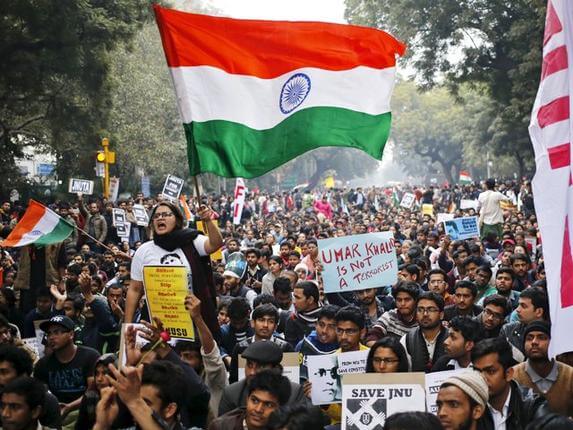
“Sedition” refers to conduct or speech inciting people to rebel against the authority of a state or monarch. In India, the offense of sedition is covered under Section 124A of the Indian Penal Code (IPC). This section has been a subject of debate and controversy, with discussions often centering around issues of free speech, dissent, and the potential misuse of the law.
Sedition in India is defined by section 124 A of the Indian Penal Code. Section 124A was introduced by the British colonial government in 1870 when it felt the need for a specific section to deal with the radical Wahabi movement of the 19th century, led by Syed Ahmed Barelvi and centered around Patna.
Section 124 A of IPC
Section 124 A states:
“Whoever, by words, either spoken or written, or by signs, or by visible representation, or otherwise, brings or attempts to bring into hatred or contempt, or excites or attempts to excite disaffection towards the Government established by law shall be punished with imprisonment for life, to which fine may be added, or with imprisonment which may extend to three years, to which fine may be added, or with fine.
- Explanation 1 – The expression “disaffection” includes disloyalty and all feelings of enmity.
- Explanation 2 – Comments expressing disapprobation of the measures of attempting to excite hatred, contempt, or disaffection, do not constitute an offense under this section.
- Explanation 3 – Comments expressing disapprobation of the administrative or other action of the Government without exciting or attempting to excite hatred, contempt, or disaffection, do not constitute an offense under this section.”
Sedition laws in India

Altogether, Sedition laws are found in the following laws in India:
- the Indian Penal Code, 1860 (Section 124 (A))
- the Code of Criminal Procedure, 1973 (Section 95)
- the Seditious Meetings Act, of 1911 and
- the Unlawful Activities (Prevention) Act (Section 2 (o) (iii)).
Some Famous Sedition Trials
- It is accepted that the first time, the act was invoked, was against Jogendra Chandra Bose, the editor of Bangobasi, for voicing against the Age of Consent Bill, of 1891.
- Bal Gangadhar Tilak. First in 1897 for exhorting to act against Rand, the Plague Commissioner. Second in 1909 in respect of certain articles published in the “Kesari” in May and June 1908, he was deported to Mandalay.
- Gandhiji in 1922, for three articles published in the magazine Young India.
- Cartoonist Aseem Trivedi, 2011. He was arrested in Mumbai under IPC Section 124 (sedition), section 66 A of the Information Technology Act, and section 2 of the Prevention of Insults to Nation Honour Act. The Kanpur-based artist had been accused of putting up banners mocking the Constitution during a rally of anti-corruption crusader Anna Hazare in Mumbai and posting the same on his website.
- Dr Binayak Sen was accused of sedition by the Chhattisgarh government in 2011. An Indian pediatrician, public health specialist, and activist, Dr Binayak Sen is the national vice-president of the People’s Union for Civil Liberties. He was accused of acting as a Maoist messenger
- Arundhati Roy, Hurriyat leader Syed Ali Shah Geelani, and others were booked on charges of sedition by Delhi Police for their “anti-India” speech at a seminar in 2010, for advocating independence for the disputed Kashmir region.
- Praveen Togadia was in 2003 slapped with the charge of sedition by the Rajasthan government. The charges include an attempt “to wage a war against the nation.”
- The latest case against JNUSU President Kanhaiya Kumar.
Sedition laws vs Freedom of Speech and Expression
It is argued that along with colonial laws like criminal defamation, laws on obscenity, and blasphemy, the sedition law also runs against the idea of Freedom of Expression, guaranteed under Article 19 (1) (a) of the Indian constitution. Why such an argument against an otherwise pious act that thwarts acts threatening India’s sovereignty?
- Gandhiji was one of the greatest opponents of the sedition act. It is only appropriate to quote his defense, during the 1922 sedition trial. He said, “…Section 124 A under which I am happily charged is perhaps the prince among the political sections of the IPC designed to suppress the liberty of the citizen. Affection cannot be manufactured or regulated by the law. If one has no affection for a person, one should be free to give the fullest expression to his disaffection, so long as he does not contemplate, promote or incite to violence. But the section under which Mr Banker and I are charged is one under which mere promotion of disaffection is a crime. I have studied some of the cases tried under it, and I know that some of the most loved of India’s patriots have been convicted under it. I consider it a privilege, therefore, to be charged under that section. I have endeavored to give in their briefest outline the reasons for my disaffection. I have no personal ill-will against any single administrator, much less can I have any disaffection towards the King’s person. But I hold it a virtue to be disaffected towards a Government that in its totality has done more harm to India than previous systems. India is less manly under British rule than she ever was before. Holding such a belief, I consider it to be a sin to have affection for the system. And it has been a precious privilege for me to be able to write what I have in the various articles tendered in as evidence against me.”
- The act faced a judicial cut in the early days of independence itself. Romesh Thapar case, in which the Madras government, after declaring the Communist Party illegal, banned the left-leaning magazine Crossroads for being overly critical of the Nehru government. The court held that banning a publication because it would endanger public safety or public order was not supported by the constitutional scheme since the exceptions to 19 (1) (a) were specific and had to entail a danger to the security of the state. The second case related to an order passed by the chief commissioner, Delhi, asking the RSS mouthpiece Organiser to submit all communal matter and material related to Pakistan to scrutiny. Nehru’s government decided to amend the Constitution (1st constitutional amendment), inserting the words ‘public order’ and ‘relations with friendly states’ into Article 19 (2); and the word ‘reasonable’ before ‘restrictions’, as a safeguard against misuse by the government.
- Ram Nandan versus State, 1958, the Allahabad HC held Section 124A unconstitutional citing it restricts the fundamental freedom of speech. But this was overturned in 1962 Kedarnath Singh versus the State of Bihar, when it held the section valid, but added a caveat that this section should be construed as to limit their application to acts involving intention or tendency to create disorder or disturbance of law and order or incitement to violence. If used arbitrarily, the sedition law would violate freedom of speech and expression guaranteed by the Constitution under Article 19.
- Even after such court judgments, different govt.s use this section to act against any out-of-sync voice in society. A peripheral glance at the background of people charged with the section also points to this. They include activists working on issues like Naxalism, tribal rights, Kashmir autonomy, corruption, etc., which have found sympathizers among the masses. In 2015, a Maharashtra govt. circular also tried to quell the dissenting voices against their government.
- It is time we followed the lead of modern constitutional democracies such as the United Kingdom, the US, and New Zealand who have severed anti-sedition laws from the law books.
Summary
Criticism against government policies and decisions within a reasonable limit that does not incite people to rebel is consistent with freedom of speech and expression. Currently, the section is slapped against any discording entity, without any fairness. It is this grey area, which needs to be corrected. Only when it amounts to an incitement to violence, such sections should be brought in.
Also Read: Hate Speech
Article by: Jishnu J Raju






Nicely written.. well researched!
nicely written 😛
Well elaborated.